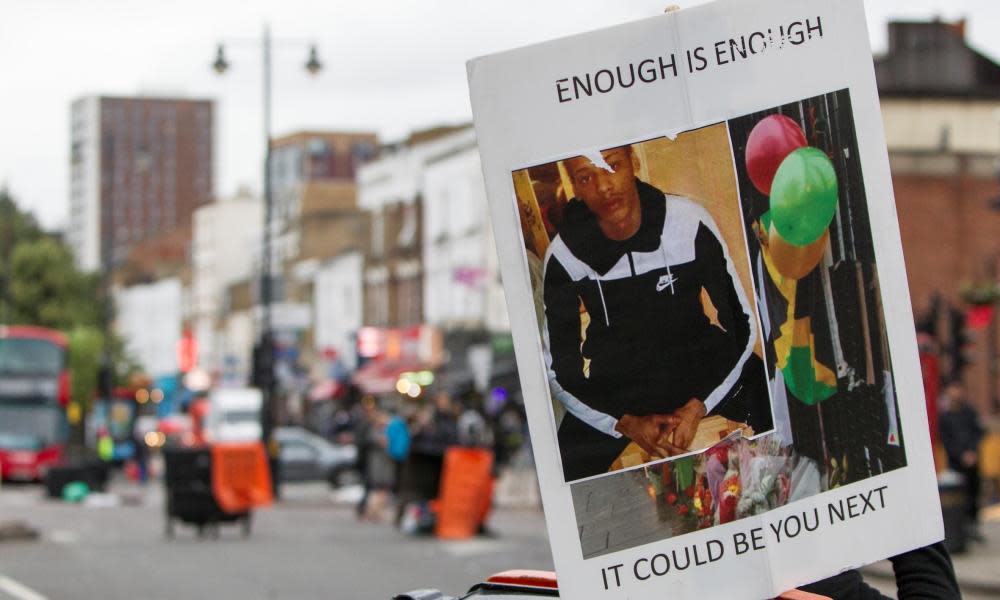Rashan Charles's family criticise Met for refusing to suspend police officer

The Metropolitan police have been criticised by the family of Rashan Charles for ignoring the advice of the police watchdog and refusing to suspend the officer involved in his death.
Charles, 20, died in July in east London after a police officer wrestled him to the floor of a shop. His death sparked protests and violent clashes with police, with protesters throwing fireworks and bottles. The family, alongside the local MP Diane Abbott, appealed for calm and peaceful protest.
With the cause of death still unknown despite two postmortems and toxicology tests, the family last week called for the Met to suspend the officer and the Independent Police Complaints Commission (IPCC) formally recommended that the force do so. But now the Met has decided against that course of action, instead placing the officer on restricted duties.
A statement from Charles’s family called on the force to reconsider. “This decision sends completely the wrong message about how seriously the Metropolitan police take what happened to Rashan,” they said.
“We are disappointed and concerned that the simple reality of what is seen in the recording has not been translated into prompt and effective action by the police, CPS and IPCC: to suspend this officer and to investigate him as a suspect in possible criminal offences, as well as for gross misconduct.”
The Met said the decision was taken after “very careful consideration of the matter” and a full rationale of the decision had been provided to the IPCC, which is conducting an independent investigation into the case. The force is not obliged to follow the recommendations of the IPCC.
The family said that even the decision to place the officer on restricted duties, which means he will be office-based and not in contact with the public, had taken too long.
Video of the incident, which followed an attempted vehicle stop, appears to show Charles swallowing a package, leading to speculation that it contained illegal drugs. It was later found to have been a mixture of caffeine and paracetamol. He died in the Royal London hospital in Whitechapel soon afterwards.
“Footage of this incident has been publicly available since 22 July. It shows the unprovoked use of a great deal of force on a young man,” the family statement said.
“Rashan died within minutes of that force being used, and we have not been satisfied that he received safe and prompt care from the police. Subsequent statements suggesting that Rashan ‘became unwell’ or that the officer was in some way ‘helping’ him are a distortion of what we can all see on screen.”
The Met deputy assistant commissioner Richard Martin said: “I fully understand the strength of public feeling about the tragic death of Rashan Charles in Hackney.
“I have carefully considered the IPCC’s representations and the views of key partners in making my decision. The officer concerned will be office-based and have no direct contact with any member of the public whilst the investigation is ongoing.
“As always, the serving of a notice by the IPCC does not mean that misconduct has been proven against an officer.”
A spokesperson for the Met added: “Police regulations state that an officer under investigation should not be suspended if temporary redeployment to alternative duties is appropriate. In this instance, DAC Martin believes the temporary redeployment of the officer is both appropriate and proportionate.”
Martin said both the officer concerned and the Met had fully cooperated with the IPCC investigation and would continue to do so.
A coroner’s inquest in front of a jury into the cause of death will not be held until June 2018, since it cannot be held at the same time as an IPCC investigation.
Charles’s family released a statement through their lawyers Inquest last week criticising the pace of the investigation, the delay in taking action against the officer and the projected year-long wait for an inquest.
They said they would prove unequivocally that Charles was a victim of gross ill-treatment and the police officer did not respond with the emergency medical care necessitated by his actions.
The IPCC said it would not be responding to requests for comment had made its position clear in its correspondence with the Met.

 Yahoo News
Yahoo News 
